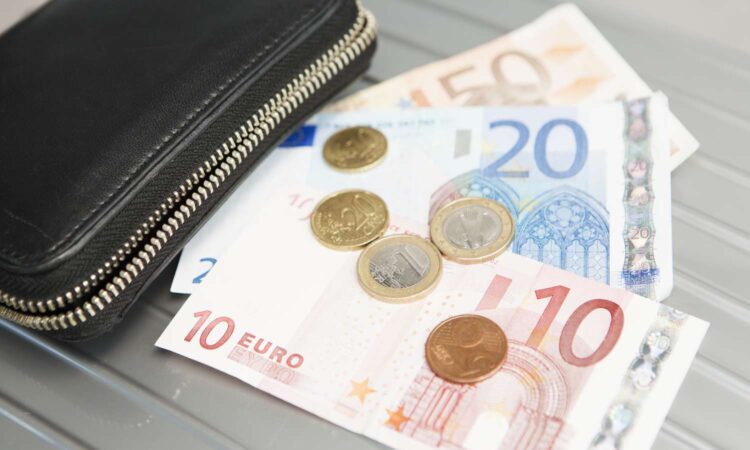
The withdrawal of the United Kingdom from the European Union (a move known as “Brexit”) formally occurred on January 31, 2020. Following that departure is a transition period lasting until January 1, 2021, during which the U.K. and E.U. will negotiate the terms of their future relationship. This article has been updated as of the January 31st, 2020 withdrawal, and you can find up-to-date information about details of the transition on the U.K.’s government website.
As a visitor traveling between the U.K. and Continental Europe, you may wonder whether you have to keep changing your currency every time you cross from the Euro Zone into the UK. Can you spend your euros in London and elsewhere in the UK?
This may seem like a simple, straight forward question but the answer is a little more complicated than that. It is both no and, surprisingly, yes… and also maybe. More importantly, is it a good idea to even try to spend euros in the UK?
First, the “No You Can’t” Answer
The official currency of the U.K. is the pound sterling. Shops and service providers, as a rule, only take sterling. If you use a credit card, regardless of the currency in which you pay your bills, the card will be charged with sterling and your final credit card bill will reflect currency exchange differences and whatever fees your issuing bank levies on foreign exchange.
And Now for the “Yes, Maybe”
Some of the U.K.’s bigger department stores, especially the London stores that are tourist attractions in themselves, will take euros and some other foreign currencies (US dollar, Japanese yen). Selfridges (all branches) and Harrods will both take pounds sterling, euros, and US dollars at their ordinary cash registers. Selfridges also takes Canadian dollars, Swiss francs, and Japanese yen. Marks and Spencer does not take foreign currency at the cash registers but it, like other stores popular with visitors, has bureaux de change (literally foreign exchange desks where you can readily change money) in most of its larger stores.
And About That “Maybe”
If you are thinking of spending euros in England or elsewhere in the U.K. keep in mind that:
- Even if a shop takes foreign currency at its cash registers, your payment is still a foreign exchange transaction, subject to exchange rates (the difference in value between one currency and another.).
- Exchange rates calculated at the cash registers by stores that take euros may not be the best rates you can get, may be out of date, or may be subject to a small extra fee.
- Shop assistants are not really accustomed to taking foreign currency and your transaction may take longer than you’d like.
- Those stores that do take euros will generally only take euro notes, not coins.
- You will have to pay for your goods using one currency or another. You cannot pay for part of your purchase with euros and part of it with pounds sterling.
- You are very unlikely to find retail shops that will exchange your euros for pounds sterling outside of London.
- Even within the U.K., there are currency confusions. The Bank of Scotland and the Bank of Northern Ireland both issue their own versions of pounds sterling. The notes have different pictures and the coins have different engravings. Visitors returning to London from Edinburgh or Belfast with Northern Irish or Scottish pounds often have difficulty with cashiers refusing to accept them, even though they are legal tender. So imagine trying to pay with euros.
The Best Strategy for Euros and Other Foreign Currencies
Change the currency when you get home. Every time you change money, you lose some monetary value in the exchange. If you visit the U.K. as the last stop before heading home, or if your visit is part of a tour of several countries, it’s tempting to change your funds into the currency of the country you happen to be in. Don’t. Instead:
- Buy the minimal amount of currency you think you’ll need to get by. It’s better to use your credit or debit card to buy a little extra than to have loads of foreign currency left over.
- Remember to use up your coins; they are almost impossible to change between currencies.
- Hang onto your leftover currency until you get home. Put away your euros, Swiss francs, Danish krone, and Hungarian forints in a safe place and change them all at once into your own national currency when you get home. If you don’t, you lose value with every exchange.
Beware of Scammers
In some parts of the world, dealers who have identified you as “foreign” may try to sell you currency in exchange for dollars or euros. If you’ve traveled to the Middle East, parts of Eastern Europe, and Africa, you may have already encountered this.
This practice is virtually unknown in the U.K. so, if you are approached, don’t be tempted. Be on your guard because you are probably being hustled. The person offering you the exchange may be trying to pass you counterfeit money or may simply be distracting you while their pickpocket/purse snatcher friends get to work.



